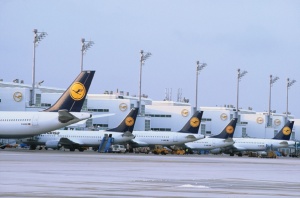EU seeks to boost airport capacity with new measures

The European Commission has announced a package of measures designed to increase capacity airports in Europe, reduce delays and improve the quality of services offered to passengers.
The measures address the quality of services passengers and airlines receive on the ground before they take off and after they land, the transparency of decisions on airport noise, as well as the efficiency of the complex network of take-off and landing slots that make up every journey.
Vice president Siim Kallas, European commissioner responsible for transport said: “Europe’s airports are facing a capacity crunch.
“If business and the travelling public are to take best advantage of the air network, we have to act now.
“Some 70 per cent of all delays to flights are already caused by problems on the ground not in the air.
“On present trends, nineteen key European airports will be full to bursting by 2030. The resulting congestion could mean delays for half of all flights across the network. The status quo is not an option for airports in Europe.
“Faced with intense global competition, if we do not change the way we do business, we may not be doing business at all.”
The package consists of a policy summary document and three legislative measures, on slots, ground-handling and noise.
On slots
The Commission proposals introduce market based mechanisms for the trading of slots between airlines in a transparent way, as well as measures to ensure that existing capacity is used by airlines - by raising the threshold on the “use it or lose it rule” from 80-85 per cent.
The proposed measures on slots would allow the system to handle 24 million more passengers a year by 2025.
They will be worth €5 billion to the European economy and create up to 62,000 jobs over the period 2012-2025
Five European airports are currently operating at capacity: Düsseldorf, Frankfurt, London Gatwick, London Heathrow, and Milan Linate.
On current trends this could increase to nineteen key airports by 2030, including for example Paris CDG – with very significant consequences for delays and congestion.
On ground-handling
The Commission is putting forward proposals to improve the quality and efficiency of ground handling services at airports.
Measures will include: increasing, for key ground-handling services that are still currently restricted - baggage handling, ramp handling, refuelling and oil, freight and mail services - the minimum choice of ground-handlers available to airlines at large airports from two to three.
At the same time, there are new proposals to allow Member States to go further in protecting workers rights so staff can transfer under existing conditions when a contract goes to a new provider.
This is essential to provide the stable employment conditions necessary to maintain a high quality workforce in what is a labour intensive sector.
The proposals strengthen the role of airports as the “ground co-ordinator” with overall responsibility for the coordination of ground-handling services at an airport.
They provide airports with a set of new tools to do this, for example, to require minimum quality standards to be respected by all ground-handlers at their airport.
These measures will strengthen also the resilience of airports facing major disruptions.
On noise
The Commission proposals increase the transparency in the process of setting noise-related restrictions at airports, including an oversight role for the commission.
This is not about targets, but about the decision-making process. It gives the Commission a scrutiny role – it does not replace a Member State’s final decision.
The proposals also update existing legislation in line with technological developments to make it easier for authorities to phase-out the noisiest planes.
Decisions on cutting noise levels have to balance protection for citizens living close to airports against the needs of those who wish to travel. Decisions must be taken in line with guidelines set at international level (by the UN body, the International Civil Aviation Organisation).
Residents are entitled to be protected from excess noise from airports but it is necessary to take into account costs in terms of lost capacity and the impact on economic growth in a region.
Industry Response
While acknowledging some “positive changes” the European Regions Airline Association (ERA) said opportunities had been missed.
Mike Ambrose, director general of ERA - which represents more than 60 intra-European airlines - said: “No modification to the existing Regulations on slots, ground handling and noise will ever create the capacity that is required to stimulate economic recovery within Europe and provide the international market access to ensure Europe remains globally competitive.”
The Commission itself cannot compel States to implement new capacity at airports but it does have the ability to encourage and facilitate capacity development at an EU level and such initiatives would certainly be supported by the industry,” he added.

